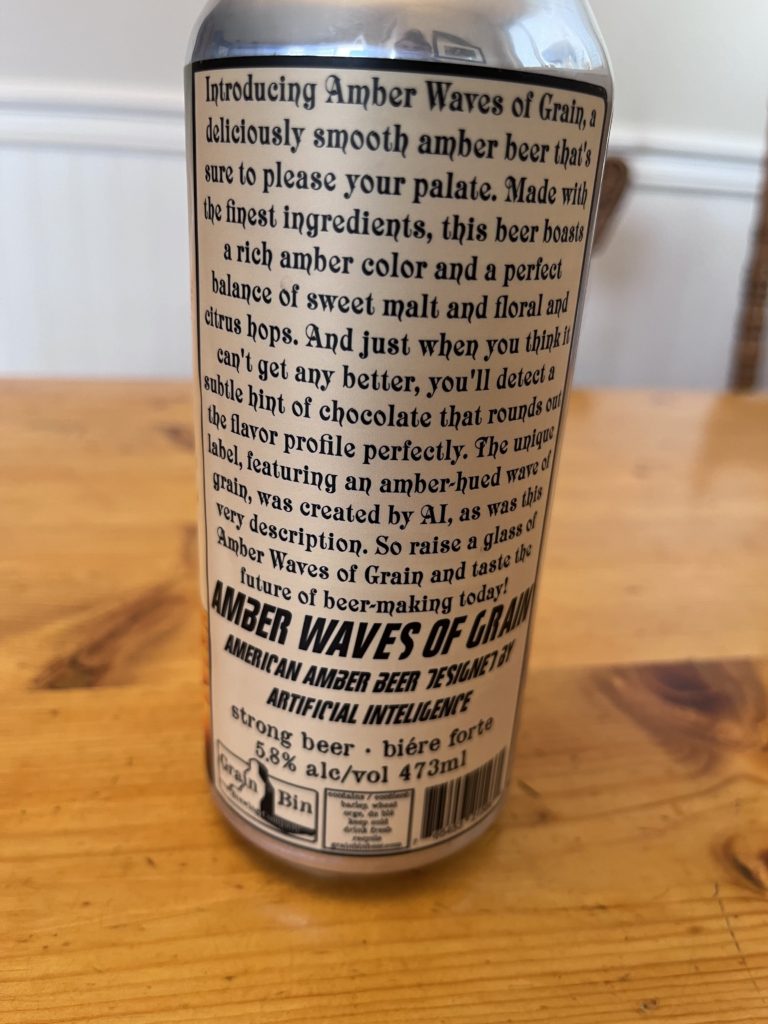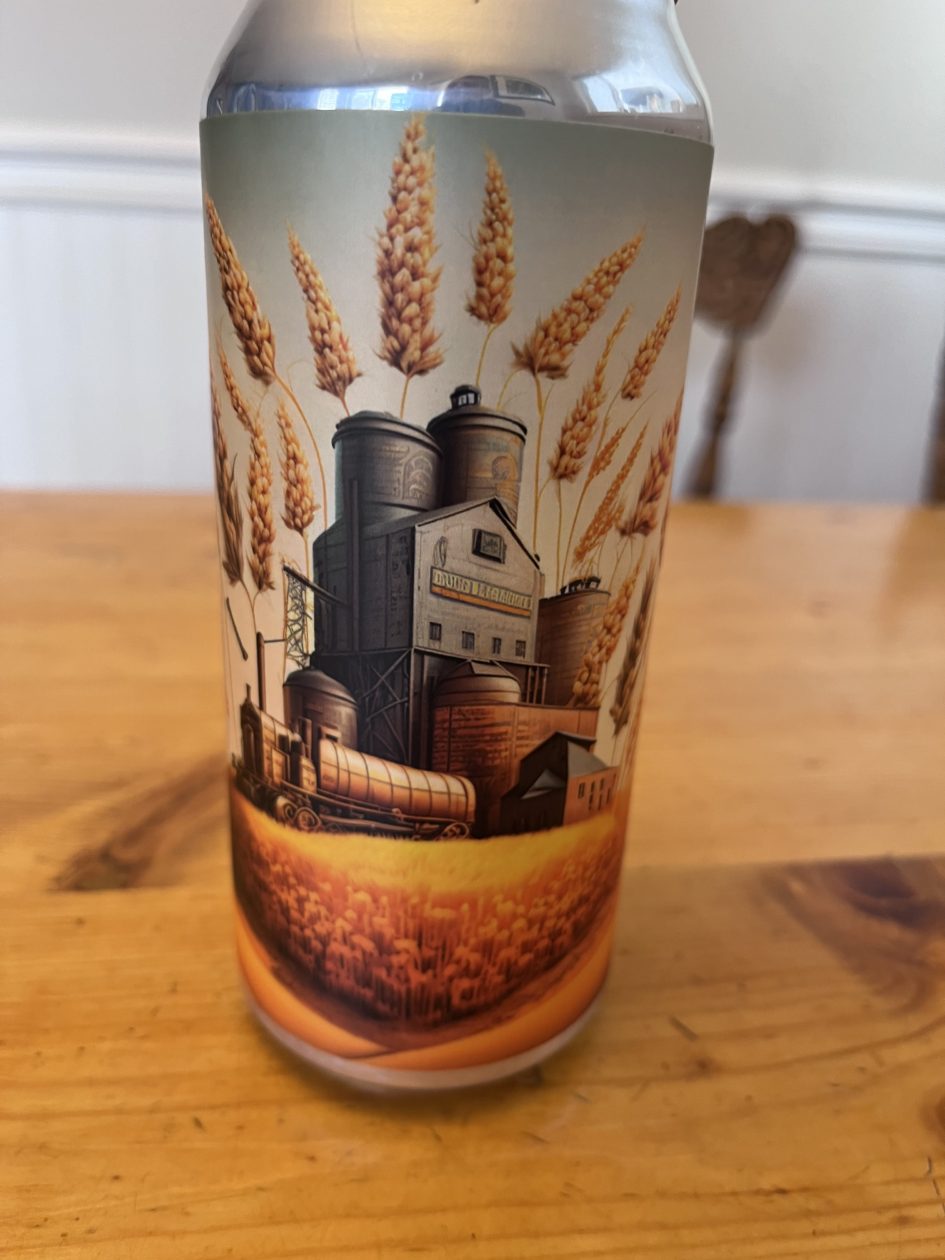These days it seems like Artificial Intelligence (AI) is invading every human activity, from self-driving trucks, to apps that can write your history essay and imitate the work of famous artists. But craft beer must surely be immune, right? Right? Don’t be so sure.
Seems like even beer isn’t safe from the robots. This week Grande Prairie’s Grain Bin Brewing released a beer created entirely by AI. Not the actual brewing, of course, but every other aspect of the process was controlled by AI. AI picked the style, designed the recipe, and established the water profile. AI named the beer, created the label art, and wrote the description for the cans. Finally, AI provided the marketing and sales strategy, wrote the media release and even set the price point.
This wasn’t computers run amok. It is an experiment by Grain Bin to see what would happen. Dalen Landis, Grain Bin’s owner and head brewer known for his creativity and willingness to navigate unchartered beer waters, says the project is about having a conversation about AI and how we as a society are managing it. He isn’t necessarily an AI proponent, but wants us to think about AI in a broader social and economic context.
Specifically he wants us to think about what role AI SHOULD play in society. Landis observes that for many AI is a threat because it takes jobs and livelihoods away from people. But he wonders, all things being equal, are these jobs people would choose to do if they didn’t need them to feed their families? He contemplates that if we had a society where people’s basic needs were met, would we see AI as such a threat? And if we had such a society what role would we have AI fulfill?
Big questions, the kind best discussed over a beer, and certainly too philosophical for a beer blog. But Landis’ experiment also raises questions about the role of AI in the beer industry. That, I feel, I this space is more equipped to tackle.
Grain Bin is not the first brewery to incorporate AI into elements of beer production. In 2021 Toronto-based Kensington Brewing collaborated with an AI company to “teach” their algorithm how to design a good IPA recipe and after six months of machine learning brewed the final product. A couple breweries in the U.S. have used AI to assist in designing a beer or to help select the “best” recipe for a style (a dubious premise, in my opinion). One brewery uses AI to filter through consumer feedback to provide direction on how to tweak the beer. Carlsberg has installed AI technology to assist them in their product development process.
But to be honest, I think Grain Bin might be the first brewery to hand EVERY aspect of a beer over to AI. My research did not reveal another example, at any rate.
The results are interesting. It came up with an American Amber Ale, which is not surprising. Its recipe struck both Dalen and myself as more akin to a homebrew recipe than a commercial recipe, using six different malts and three different hop varieties, which makes sense when you think about it since there are thousands of homebrew recipes online and very few commercial recipes. I found the recipe to be a bit odd. For example it uses Cascade, Hallertau and Northern Brewer hop varieties; a very strange combination if you ask me.
The name, Amber Waves of Grain, is okay but seems to be trying too hard to be poetic. (Funny aside, Dalen and I met at Bent Stick Brewing to chat about this and they had just released Amber Waves American Amber Ale at the taproom). The label seems a bit too ornate and elaborate (see photo above) and the descriptor notes are too breathy. It uses the word perfect/ly twice. And this line is just too much: “And just when you think it can’t get any better, you’ll detect a subtle hint of chocolate that rounds out the flavor profile perfectly.” Please. Plus I guess AI uses American spelling.
Landis says the price it selected is “in about the middle” of their regular price range. The AI suggested he sell the beer direct to consumers and not use a distributor (which he is doing, although he is giving some to loyal liquor stores). It even suggested he talk to beer writers to promote the release (which I guess is where I come in).

The beer itself is decent, but seems to lack an internal coherence. It is on the dark end for an American Amber, with some haze. The aroma is a combination of dark caramel, rich toffee, and both a piney and an earthy hop note. The front end of the sip has a nice toffee malt with touches of tougher grain. Caramel with a hint of chocolate affect the middle. The hops come up on the back end in a confusing melange of pine, woodiness and earth. There is a slow build in the bitterness, which I find rather pleasant.
Overall it approximates an American Amber fairly well, but has enough anomalies to push it out of style. Not fitting a style is not necessarily a problem. Mostly it is the conflicted hops and indecisive malt that leave me wondering. I am pretty certain an experienced human brewer would have caught the incongruities and altered the recipe accordingly. To be clear, I know Landis is an excellent brewer and was guided only by his commitment to the experiment and so resisted his brewing instincts.
And it is a fun experiment, to be sure. What does it say about the future of AI in beer?
Automation has long been a part of the brewing industry, especially among the big boys. Their brewers sit in control rooms pushing buttons and passively monitoring the progress of the mash, sparge and boil. Even small breweries buy canning and bottling lines to avoid hand-packaging product. To be frank, all of those technologies are about efficiency, which is another word for reducing the number of workers (or worker hours) needed to produce their product. AI fulfills the same function, just in areas previously resistant to automation.
I highly doubt AI-designed recipes will become anything but an occasional experiment. AI cannot match an experienced brewer, who understands their brewhouse and can touch and taste the ingredients. Besides isn’t recipe design one of the fun parts of being a brewer? It certainly is for me.
As for other aspects of the business, such as marketing, graphic design and process management, there may very well be a role. One brewery (who I won’t name as it was an off-the-record conversation), is discussing using AI to create first drafts of tasting notes and promotional material. They see it as a time-saver. Even if only 50% of the copy is usable, the writer still has a healthy start to work with. I imagine the same with label design. With enough direction and feedback, AI could learn to create labels that meet a brewery’s visual goals. And I imagine AI could find small efficiencies in various processes which could be valuable.
But I can’t help wonder, what is the point? I love to write. I don’t find it a chore (most of the time). Part of the process is staring at that blank page/screen. Graphic artists love creating new images and designs. That is why they do what they do. The only reason to switch to AI is money. It is cheaper than hiring a writer or a graphic designer.
And if that is the only advantage, does it really have a place in craft beer? I don’t want to over-romanticize the craft beer industry, but part of the ethos built into the sector is the commitment to authenticity and respect for the “craft”. Spitting out computer generated labels and following machine-evaluated “best” recipes seem to run counter to that ethos. Sure, breweries are businesses and need to make money. I get it. But if eliminating your human graphic designer is what you need to do to stay afloat, you have way bigger problems than who does your labels.
I think that is Landis’ point. He wants to have an honest conversation about AI’s role in the industry, and society. Sure, AI can do these things, but do we want it to?


Leave a Reply